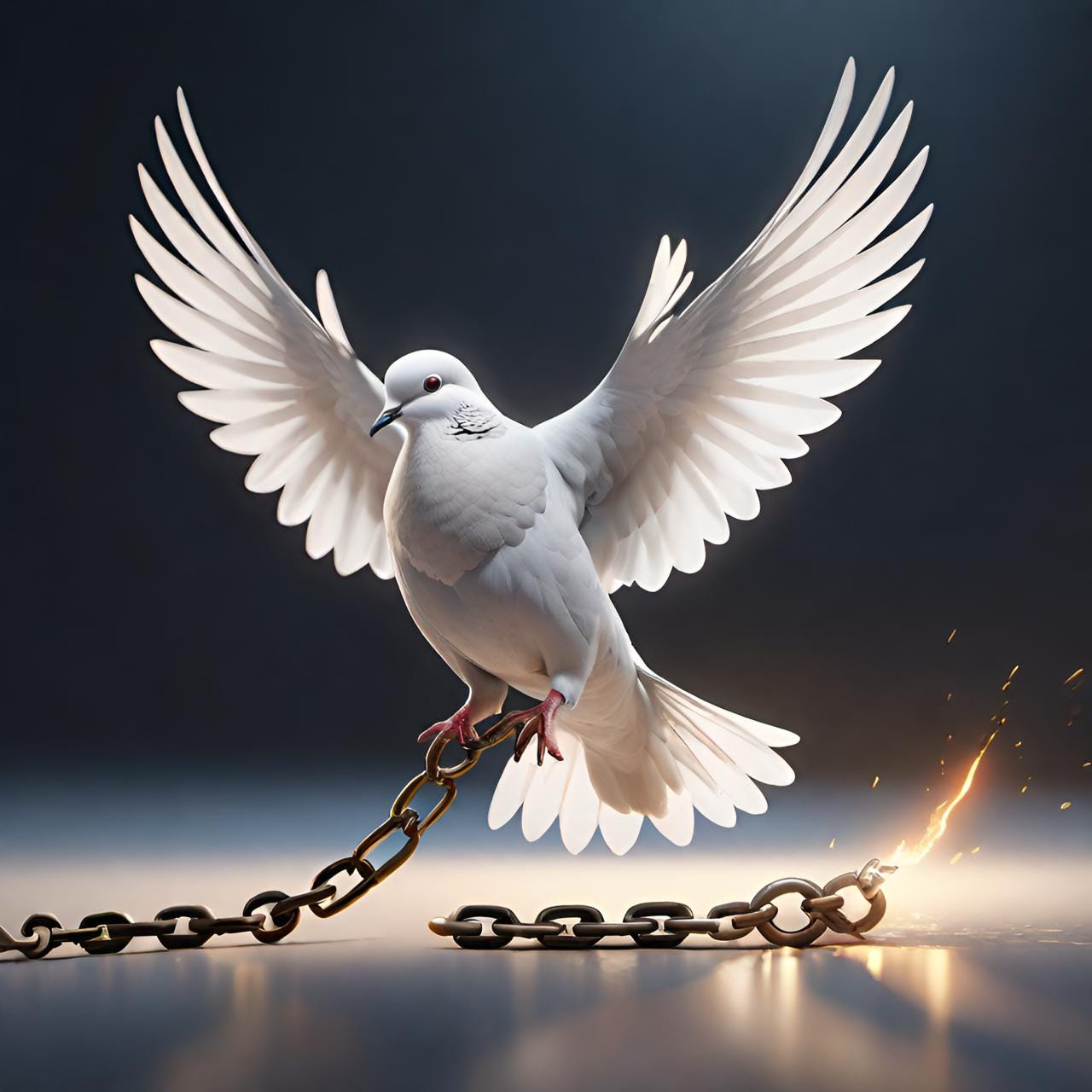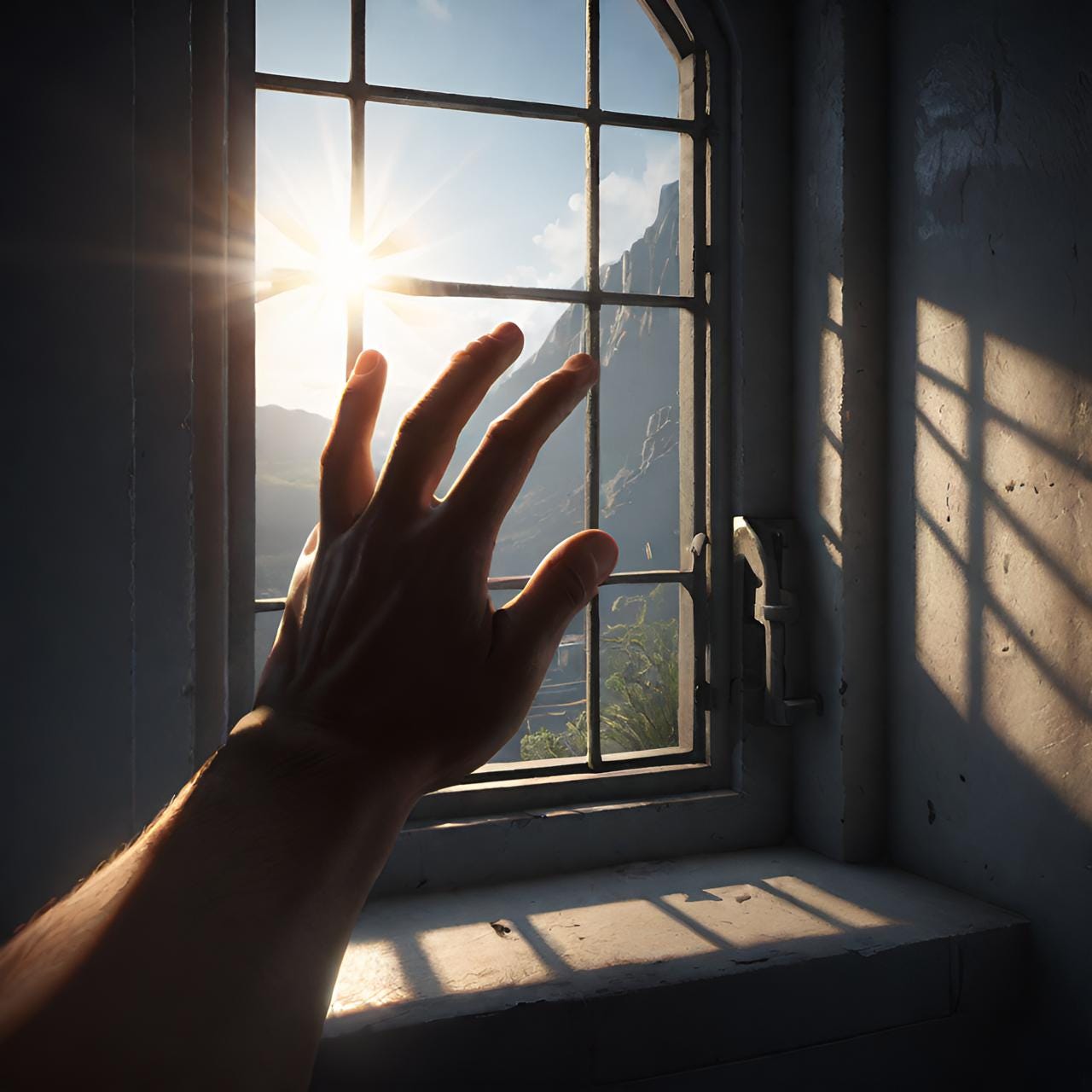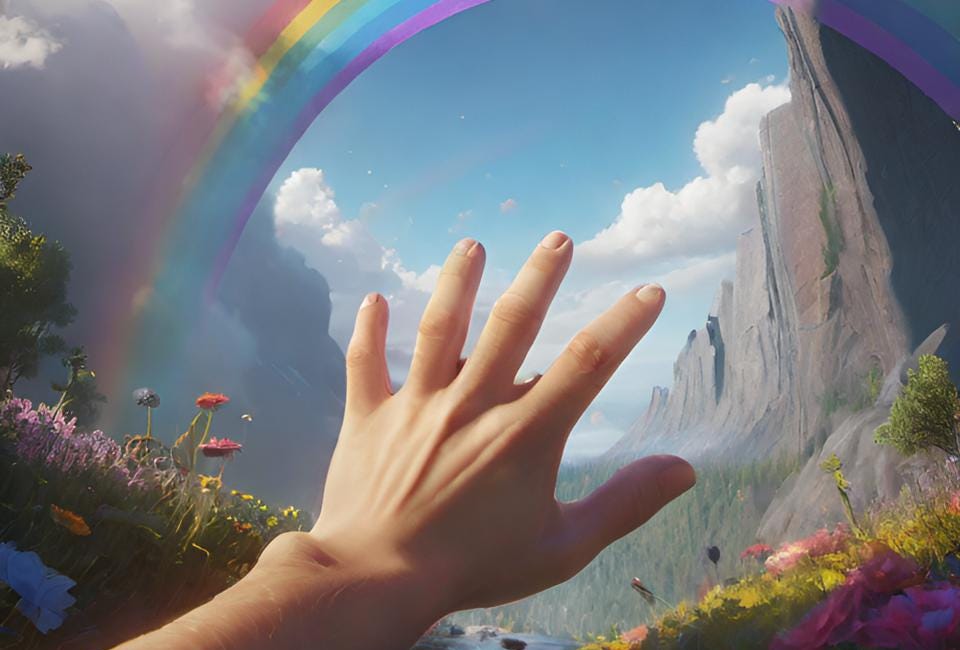Every time I suggest that free will may not exist, I get a lot of emotionally-driven flack - we don’t like to be reminded that perhaps we aren’t as free as we told ourselves we were. Yet unfree will is not necessarily bad; and this coming from an individual freedom advocate.
Our simplistic binary worldview demands its pound of dichotomy, so when I reject free will, I often receive accusations of supporting the polar opposite of free will - determinism. The insinuation is that I consciously choose to reject the notion of free will because it suits me to make excuses for my failures - or even worse, to justify the crimes of criminals. Could a straw man be any more non-sequitur-ish?
Side track: A false dichotomy of two unrealistic extremes is not an intelligent way to close our minds to ideas that challenge our cherished beliefs. Binary thinking limits our potential because it goes like this: “If you are against this, then you must be pro that.” Embarrassing for our species, to say the least.
No, my reluctance to gloat in the self-obsessed faux glory of “free will” is not about the denial of self-accountability; quite the opposite.
Hear me out…
Giving me the benefit of the doubt
Indeed, determinists believe that free will does not exist - they also seek to absolve themselves of the stain of their crimes, immoralities and failures. This is the exact opposite of what I propose.
The absence of free will does not necessarily mean that you are not responsible for your actions; you still reap the rewards and punishments naturally attached to your unearned immutable characteristics - and that’s fair. For example, if you happen to be born attractive, then you deserve an attractive spouse, even if you never earned it - they didn’t either. If you were born ugly, then you don’t deserve a pretty spouse - it is what it is. It’s not fair, but it’s not unfair either. Unfair would be to try to forcefully equate the inequitable.
Nature is indifferent to us, and it owes us nothing. What would be even more unfair is feeling entitled to and demanding equal treatment when you don’t measure up.
Similarly, if your acquired psychodynamics led you to commit a crime, you’re not off the hook just because your unfree will “made you do it.” You still deserve analogous reciprocity, because your victims’ unfree will also guide them thus. If you absolve yourself of your crimes by evoking determinism, then you should also absolve your victims of their vengefulness against you - so you are accountable for your actions either way.
Freedom from free will does not mean freedom from consequence.
Does free will exist or what?
So, why do I insists that free will does not exist? What are the implications of accepting that even our free thinking is determined by our mental architectures, which were structured by randomly acquired life experiences and genetics?
If even our own “free will” is the result of mental processes shaped by externally determined neural pathways, then what are we other than purposeless automata? This is where I refer you back to my thesis on free will.
I reject free will because, if we assume that we have free will, we deflect self-accountability, even if this sounds counter-intuitive at first. But think about it…
Free will may exist only once you accept that it doesn’t. I hope that, by the end of this thesis, I will have made it clear…
Objections
“What are you talking about? How is free will against self-accountability? You aren’t making any sense!”
Notice how the people who insist on free will tend to use it to make two important points:
To give themselves full credit for their achievements, without showing any recognition or gratitude for the advantages they happened to have in life.
To fully blame an undesirable for his abhorrent behaviour, thus refusing to recognise where they could have played a part in his affliction, or at least, how they could help empower him, rather than keep pushing him down on top of his misery.
Just like determinists tend to be people who messed up in life, and therefore seek to free themselves of any blame or responsibility, so do their polar opposites. Free-will advocates tend to be people who feel they’ve succeeded, yet they do not wish to attribute any of their perceived successes to randomness. Both polar opposites are the same: they both deny self-accountability. The failures don’t hold themselves responsible for their mistakes, and the successful don’t hold themselves accountable for seizing unearned opportunity. They are both dishonest.
This statement tends to offend people on both extremes…
“What are you saying? I made it all by myself. Why are you trying to discredit my accomplishments?”
No, you didn’t accomplish anything alone. You were born healthy in a relatively prosperous environment and opportune time, and had the right mindset and stimuli to lead you to where you are now. Your potential was bestowed upon you by nature. Even your negative experiences led to your opportunities and motivations. You found yourself in positions where your values and ideals were recognised, so of course you were motivated to uphold them. Sure you worked hard, but with opportunity, hard work comes easy. Who wouldn’t work hard if he knew his hard work would be rewarded? Who would work hard if he didn’t believe he was in a position where his toil would bear fruit?
The free will double standard
The irony is that the proponents of free will tend to seek accountability in others, but not in themselves. They cry “no excuses” as they refuse to recognise the external explanations behind someone else’s failures, because they themselves deny the external explanations behind their successes. By ‘explanations’ I don’t mean excuses, justifications or rationalizations. We are still accountable for what is or was within our power - yet we are not to blame.
There is a difference between self-accountability and self-punishment.
The people who claim full credit for their successes will switch to a deterministic attitude the second they fail. How I know this? Because if they deny the deterministic aspects of their success, it means they are biased towards self-aggrandising. So, it’s safe to assume that they will deny their responsibility in their failures, since their rationalizing is obviously driven by self-importance. For example, see all those toxic motivation gurus selling empty dreams: they flamboyantly brag about their achievements, but as soon as their YouTube views drop, they blame “the algorithm” or some Twitter mob out to get them.
Isn’t it convenient how the unsuccessful prefer to believe they were at the mercy or external factors, while the successful insist that they were fully responsible for their success? Not all of course, but many successful people tend to lack the humility that should come with admitting that every single thing they accomplished is owed to randomness more than to their “freely willed” contributions.
Conclusions
This is the crux of my argument: if the successful deny the contributions of external factors to their success and well-being, thus attributing it all to their “free will,” then it means they are not grateful for their advantages - since they refuse to recognise them. And without gratitude, there is no appreciation, since they feel entitled to their unearned blessings. How self-accountable is someone without the humility to accept that he indeed had advantage? And we all do have some advantage in something - anything.
Who cares whom we blame or make excuses for given a specific problem? While we waste time pointing fingers with regards to drug addiction, promiscuity, depression, or the biggest problem of them all - our deluded need for government - we miss the first causes, the explanations, the solutions.
It seems to me that one of the motivations to believe in free will is self-satisfied smugness. Free will proponents imply that they were better than you since they “freely” made better choices in life, even though this is a self-defeating admission that free will does not exist - they admit they were better by default, without explaining why. If they just happened to be better by default, then they were born this way, so they didn’t “freely will” their superiority. If they imply to be better by some randomly acquired skill, then again, then again they were better to begin with, enough to choose the right skill and have the by-default determination to work at it.
We miss the bigger picture when we focus on whom to blame for society’s problems, and how free our will is. This is like trying to blame someone for being born tall or short, or ugly or ill; it doesn’t matter. The river follows its path, and it doesn’t matter how the path came to be this way. We don’t sit around discussing why and how the river is shaped this way - we just build our lives around it.
Similarly, we are who we are - our potentials and limitations frame and shape us. Determinism determines us. It doesn’t matter whom we blame or thank for our ills or our strengths - we make due with what we have for as long as we have it. I we refuse to acknowledge our limitations, we have trouble defining who we are.
It is a problem when we assume that everything we have or don’t have was the result of free will. This blinds us to the truth, and detaches us from reality, so anything we do after that will be misguided. Assuming that our will is totally free makes us less free, because it makes us assume that everything is under our full control, when it isn’t. We then pretend to wonder why we fail having not considered things beyond our control. The same goes for the deterministic mindset: If everything we do we attribute to factors beyond our control, then we fail to realise that just by being aware of what we can’t control may in fact grant us some control.
It seems that we cannot escape our nature. To not recognise this prison is to be forever doomed to be bound in it. To see the prison for what it is may be the only way to at least look outside the barred window.
A slave who thinks he is free is defined by slavery. A slave who knows he is a slave may at least be free enough to realise that he is a slave.
Takeaway
So, why am I against the notion of free will? Because I think that the only free will we can have is being aware of our bondage to our nature. We are bound to and by our nature. Not acknowledging its hold on us means we are hopelessly at its mercy. It’s being in a prison thinking we’re free. Only by seeing the prison for what it is do we earn some measure of freedom, perhaps the only freedom we can attain.
It takes humility to accept that your successes are not attributed to you. And you need unwavering integrity to be humble without compromising your self-esteem. Similarly, it takes humility to accept that you could have done something to avoid or mitigate your failures, despite them being deterministic in nature.
Humility (not humiliation) is about integrity and courage to be humble without being humbled. It’s not about blaming people or circumstances - it’s about boldly accepting things as they are, and still trying to improve regardless of determinism. This may be as free as we can get.
If you attribute everything to either free will or determinism, you are paralyzed in your self-aggrandising or your self-debilitation accordingly. What I propose is the middle ground:
A measure of free will may be possible only after accepting determinism - maybe.
(Some will call it “sitting on the fence”, but that’s a false dichotomy fallacy, and it is objectively asymmetrical with logic.)
Thank you for freely willing to read this.
This post was a follow-up to:
Free Will Exists!
People insisting on “free will” are selling you something. Hear me out… Free-will advocates either want to flatter your decision-making skills before they lead you on to buy what they sell (and make you think it was your “free” decision), or they insinuate that their relative success (compared to your failures) is 100% a product of their own hard work, w…
Someone you know needs to read this… Or needs to be trolled by it.
Subscribe for free. I won’t flood your inbox.









If you haven’t read Viktor Frankl you should because Nazi Germany can be seen as a metaphor (or even a real life experiment ) for your argument against free will and the people are your test subjects (not only the Jews but every man who was a part of that system.
I’d be interested in your thoughts on that idea.
Keep up your powerful writing!
This might be the dumbest thing I've ever read in my life. It's not surprising you've been on Substack for 4 years and only have 10 subscribers...